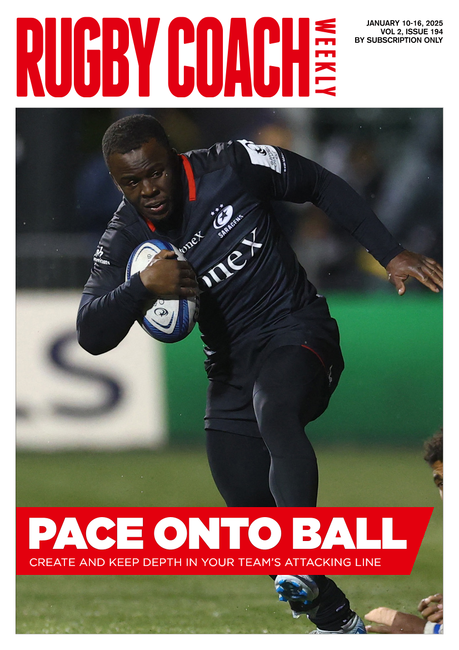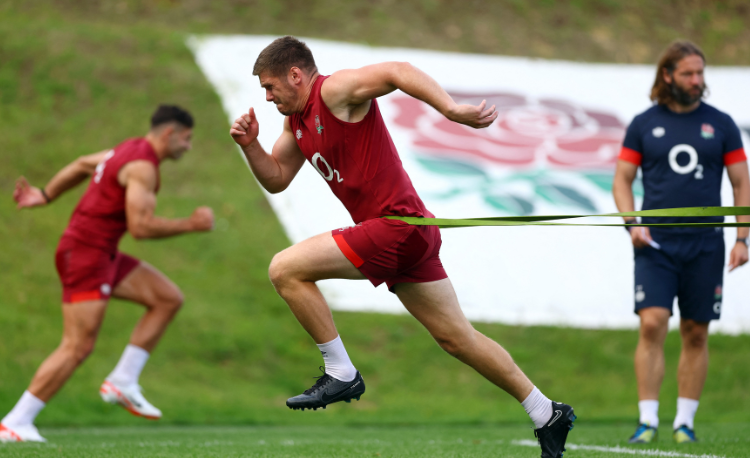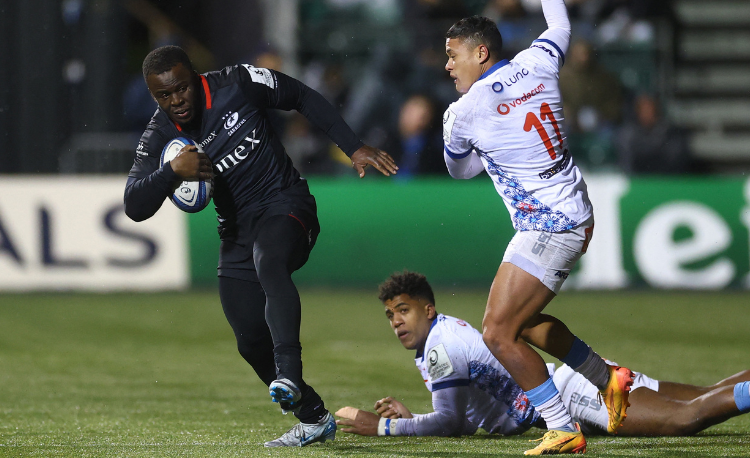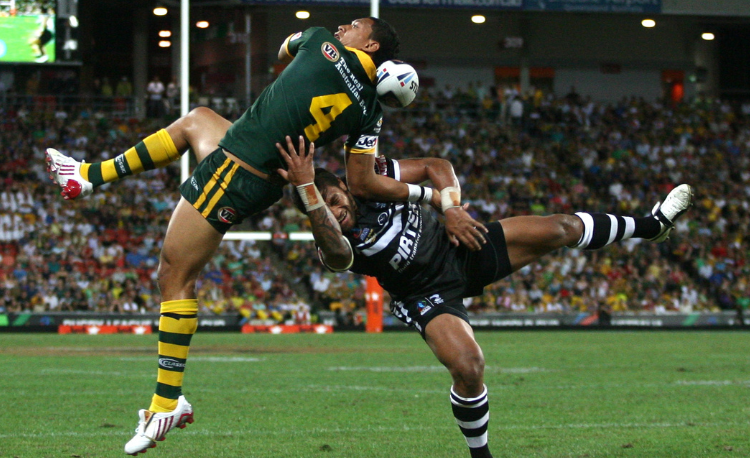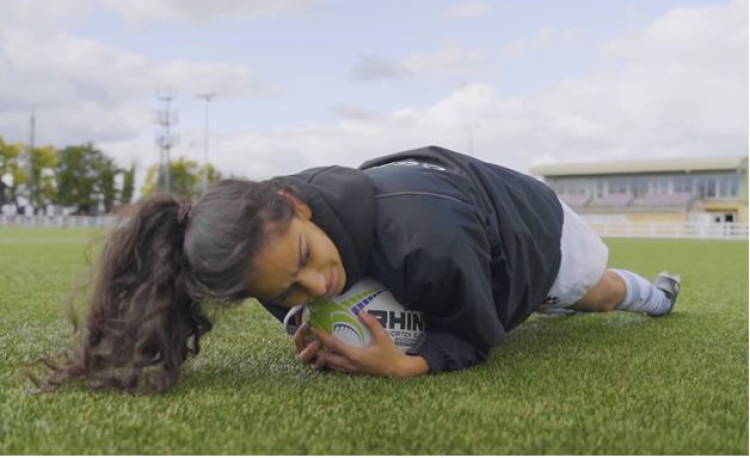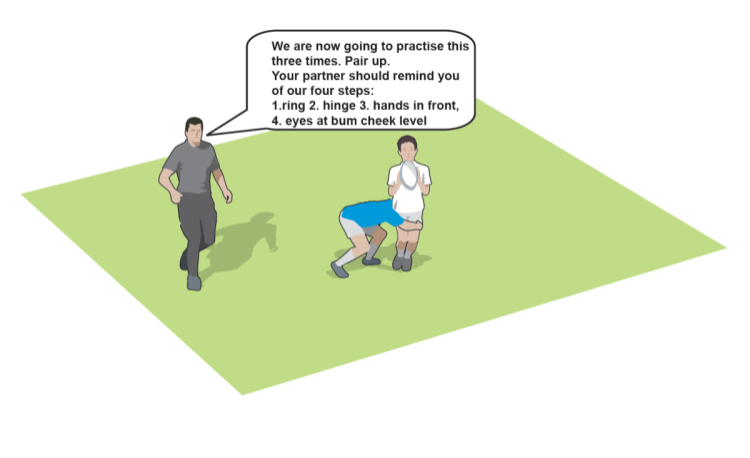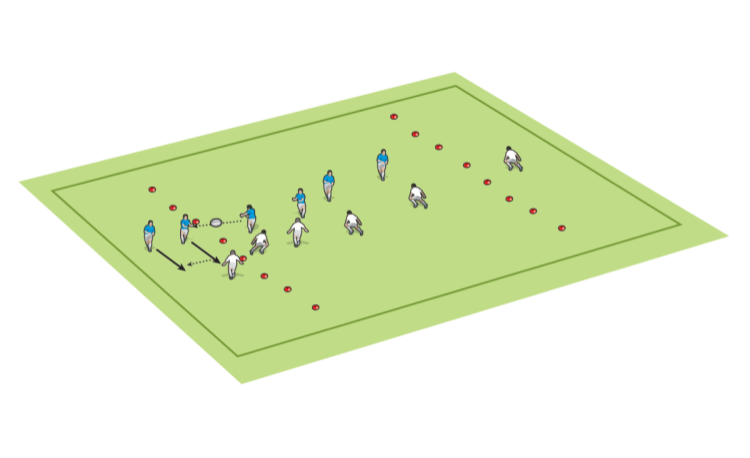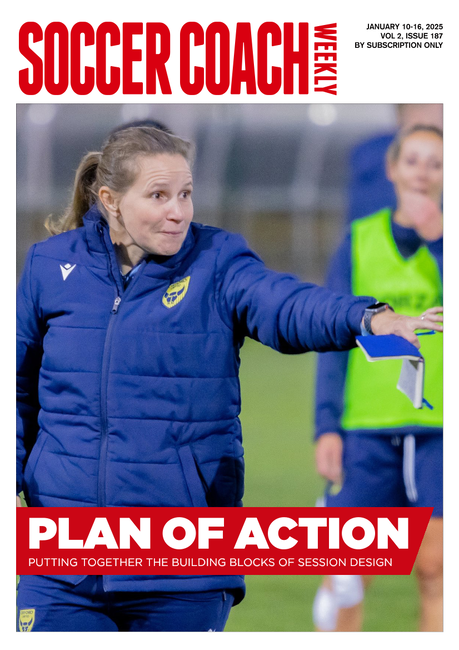How to coach kids REALISTICALLY during lockdown
While we would all hope our kids and the kids we coach are as motivated as Jonny Wilkinson to keep on training, whatever the circumstances, that simply isn't the case.
Here's how to make the best of what you and they have to offer, with expert opinion from two dads who are also team coaches: Tony Wilkinson and Jamie Green.
 Tony is an experienced grassroots coach, with two sons and a daughter. He coaches girls and boys rugby at John Leggott College. He is also the age grade chair at Scunthorpe RFC, set up the girls section and organises an outstanding programme of external CPD programmes.
Tony is an experienced grassroots coach, with two sons and a daughter. He coaches girls and boys rugby at John Leggott College. He is also the age grade chair at Scunthorpe RFC, set up the girls section and organises an outstanding programme of external CPD programmes.
 Jamie is also an experienced coach, with three sons and one daughter. He is director of rugby at Royton RFC, lead coach for the under 14s. He is also a lead coach for Saracens and Herts DPP, and PDG coach too. He's the Hertfordshire U16s forwards coach. In his spare time, he owns his own glass wholesalers.
Jamie is also an experienced coach, with three sons and one daughter. He is director of rugby at Royton RFC, lead coach for the under 14s. He is also a lead coach for Saracens and Herts DPP, and PDG coach too. He's the Hertfordshire U16s forwards coach. In his spare time, he owns his own glass wholesalers.
It’s easy if you have a keen son or daughter. They will be chasing you for challenges. Your challenge is to find ways to challenge them.
Good ways:
I’m the coach of their age group so whether they like it or not my kids get challenges. They do engage as they love sports and rugby.
My eldest is moving into the under 16s so it is easy to work on technical skills, such as his lineout throw with a step ladder and a ball. We are fortunate enough to have a decent-sized garden, so we can do fairly lengthy passing.

My younger son is competitive too but we add in affordances (constraints) so the 15 year-old doesn’t run over the 10 year-old. For example, the older one on his knees, or has to use one arm, do things from further away, make targets bigger or easier to hit for the younger one.
The younger one has also more "levels" to level up to get to the older standard. It also provides a challenge to the younger one to try to get to what his brother is doing and from the same distances.
As much as I try to keep it non-contact, they are boys and will often develop it into contact.
My 10 year-old wants to work on kicking and we have various balls to use and look at how he strikes the ball.

I find the only limitation is our imagination. We can look at utilising household objects as targets rather than breaking the drainpipes. For example, for catch-and-pass items like milk cartons and boxes offer different weights and pose different problems. Or hosepipes to mark areas, and of course, jumpers for goal posts.
My oldest is very keen and has been from an early age. He is fortunate in that his peer group within his club team are also strong players, and he is also in the local PDG group. His drive to become the best player within his groups creates a desire to practise.
He will work on his skills endlessly. If something goes wrong then he will find a way to deal with it. He will add in extra challenges if I don’t challenge him enough,
You can see this with the bottle top challenge he did. He didn't just go for it, he worked out the right techniques.
My very youngest, then it's all about fun and how can I make games as fun as possible to develop a love for the game. I find lots of potty humour and setting silly tasks for her within her play currently brings out the best.
It’s hard if:
I am competing with the lad’s friends and time is precious for them with their mates. That can be hard. They don’t have as much social interaction as they did pre-Covid-19 and they would much prefer to exercise their thumbs rather than spend time with a rugby ball.

The team are set challenges weekly but out of 23 players I get approximately two or three completing them. There's a lack of self-motivation. The lads all want to be the next Maro Itoje, but don’t understand the work that Itoje puts in behind the scenes.
I would imagine the best at training at home also have a supportive parent who takes an interest in rugby. For the ones who do the challenges I find the parents may have some knowledge or will ask for ways for their son to improve. For others, it doesn’t even cross their mind and have much more important priorities than their son’s hobby.
In terms of rugby ability, we have players who range from representative DPP to those who have only been playing six months and will shy out of tackles or struggle to catch. There is the perception of the kids about one another. If some of the "ring leaders" won’t do it, then it's unlikely the others will follow.
So, only those who have the emotional ability to want to improve and step out of the norm will be willing to do it. There is a huge: "I don’t want to look silly" perception and worry.
My second oldest is probably more naturally talented than the oldest. However, he has a different mind-set. He takes to most sports naturally. Yet, because most skills seem to come easily, he hasn't got the drive to practise to perfection. Near enough is good enough.
I find he has to be challenged either to beat his brother or with rewards schemes. I find by praising the first attempt at whatever they are trying spurs the others on as they all have a desire to please or impress their parents. I think so long as parents can show interest and praise the children will continue to partake and practice.
 With my squad in general, sadly, there are not many rugby games they can play on line which are comparable and involve their friends as games like FIFA or Fortnight can. Their interactions with their friends are important them.
With my squad in general, sadly, there are not many rugby games they can play on line which are comparable and involve their friends as games like FIFA or Fortnight can. Their interactions with their friends are important them.
There’s no magic bullet. But there are small ways to create some process or momentum.
Engage with the parents, offering them assistance which might include equipment.
Also, get them to use videos of themselves to give feedback. For example, slow-mo of techniques.
Add challenges to your groups, set a time to start and see who can achieve the skill and upload it first to your groups face book page.
For example, a new challenge will be set at 5pm tomorrow so the kids know it's coming. At 5pm, set them the challenge with the prize being something like pride of downloading first. It may not get all of them involved but it will certainly engage a few.
Finally, the biggest barrier for home training can be the parent. Anyone who’s coached their own kids will know that it is a tough boundary to keep each separate.
Perhaps start a coaching sentence with: I’m putting on my coach’s hat now. Give instruction. And then, a parent sentence with: How do you feel? I’m proud of anything you are doing.
Some kids will respond to a clear distinction, but many probably won't. Perhaps ask the kid what they would prefer you to do.
 So long as its fun cherish the one-to-one time we are getting with our own children. If they want to stop, let them.Wait for them to ask to start again.
So long as its fun cherish the one-to-one time we are getting with our own children. If they want to stop, let them.Wait for them to ask to start again.
If you have had a fun experience, they will want to replicate that the next day.
Training in the garden or home is not real. Therefore, while some gains will be made, we must be realistic. Fitness levels and skills levels will fall.
So, the real positives from home training are: mental health, some physical health and retaining team connections for the restart of the season. And as Tony and Jamie will testify too, time with your kids when you have more time. Sell that to your team's parents.
We shouldn’t sweat too much on progress. Any day spent with a rugby-related activity is a good day.
Here's how to make the best of what you and they have to offer, with expert opinion from two dads who are also team coaches: Tony Wilkinson and Jamie Green.
 Tony is an experienced grassroots coach, with two sons and a daughter. He coaches girls and boys rugby at John Leggott College. He is also the age grade chair at Scunthorpe RFC, set up the girls section and organises an outstanding programme of external CPD programmes.
Tony is an experienced grassroots coach, with two sons and a daughter. He coaches girls and boys rugby at John Leggott College. He is also the age grade chair at Scunthorpe RFC, set up the girls section and organises an outstanding programme of external CPD programmes. Jamie is also an experienced coach, with three sons and one daughter. He is director of rugby at Royton RFC, lead coach for the under 14s. He is also a lead coach for Saracens and Herts DPP, and PDG coach too. He's the Hertfordshire U16s forwards coach. In his spare time, he owns his own glass wholesalers.
Jamie is also an experienced coach, with three sons and one daughter. He is director of rugby at Royton RFC, lead coach for the under 14s. He is also a lead coach for Saracens and Herts DPP, and PDG coach too. He's the Hertfordshire U16s forwards coach. In his spare time, he owns his own glass wholesalers.WHY IT'S EASY
It’s easy if you have a keen son or daughter. They will be chasing you for challenges. Your challenge is to find ways to challenge them.
Good ways:
- Set targets
- Challenge others in the team
- Share video footage
- Shoot the “best of” footage
- Handicap challenges versus a parent
Tony says
I’m the coach of their age group so whether they like it or not my kids get challenges. They do engage as they love sports and rugby.
My eldest is moving into the under 16s so it is easy to work on technical skills, such as his lineout throw with a step ladder and a ball. We are fortunate enough to have a decent-sized garden, so we can do fairly lengthy passing.

My younger son is competitive too but we add in affordances (constraints) so the 15 year-old doesn’t run over the 10 year-old. For example, the older one on his knees, or has to use one arm, do things from further away, make targets bigger or easier to hit for the younger one.
The younger one has also more "levels" to level up to get to the older standard. It also provides a challenge to the younger one to try to get to what his brother is doing and from the same distances.
As much as I try to keep it non-contact, they are boys and will often develop it into contact.
My 10 year-old wants to work on kicking and we have various balls to use and look at how he strikes the ball.

I find the only limitation is our imagination. We can look at utilising household objects as targets rather than breaking the drainpipes. For example, for catch-and-pass items like milk cartons and boxes offer different weights and pose different problems. Or hosepipes to mark areas, and of course, jumpers for goal posts.
Jamie says
My oldest is very keen and has been from an early age. He is fortunate in that his peer group within his club team are also strong players, and he is also in the local PDG group. His drive to become the best player within his groups creates a desire to practise.
He will work on his skills endlessly. If something goes wrong then he will find a way to deal with it. He will add in extra challenges if I don’t challenge him enough,
You can see this with the bottle top challenge he did. He didn't just go for it, he worked out the right techniques.
My very youngest, then it's all about fun and how can I make games as fun as possible to develop a love for the game. I find lots of potty humour and setting silly tasks for her within her play currently brings out the best.
WHY IT'S HARD
It’s hard if:
- The kid is easily bored
- Not much room at home or outside
- Lack of equipment
- Lack of sporting understanding from parent
- Not motivated by “school” or instruction
- Not a team “player” so not keen to be involved
Tony says
I am competing with the lad’s friends and time is precious for them with their mates. That can be hard. They don’t have as much social interaction as they did pre-Covid-19 and they would much prefer to exercise their thumbs rather than spend time with a rugby ball.

The team are set challenges weekly but out of 23 players I get approximately two or three completing them. There's a lack of self-motivation. The lads all want to be the next Maro Itoje, but don’t understand the work that Itoje puts in behind the scenes.
I would imagine the best at training at home also have a supportive parent who takes an interest in rugby. For the ones who do the challenges I find the parents may have some knowledge or will ask for ways for their son to improve. For others, it doesn’t even cross their mind and have much more important priorities than their son’s hobby.
In terms of rugby ability, we have players who range from representative DPP to those who have only been playing six months and will shy out of tackles or struggle to catch. There is the perception of the kids about one another. If some of the "ring leaders" won’t do it, then it's unlikely the others will follow.
So, only those who have the emotional ability to want to improve and step out of the norm will be willing to do it. There is a huge: "I don’t want to look silly" perception and worry.
Jamie says
My second oldest is probably more naturally talented than the oldest. However, he has a different mind-set. He takes to most sports naturally. Yet, because most skills seem to come easily, he hasn't got the drive to practise to perfection. Near enough is good enough.
I find he has to be challenged either to beat his brother or with rewards schemes. I find by praising the first attempt at whatever they are trying spurs the others on as they all have a desire to please or impress their parents. I think so long as parents can show interest and praise the children will continue to partake and practice.
 With my squad in general, sadly, there are not many rugby games they can play on line which are comparable and involve their friends as games like FIFA or Fortnight can. Their interactions with their friends are important them.
With my squad in general, sadly, there are not many rugby games they can play on line which are comparable and involve their friends as games like FIFA or Fortnight can. Their interactions with their friends are important them.MAKING HARD EASIER
There’s no magic bullet. But there are small ways to create some process or momentum.
- Provide a wide range of ways to train, not just a prescribed way
- Discuss what ways they might want to do it
- Just leave the equipment around, and say absolutely nothing
- Don’t use sarcasm
- Don’t use “comparisons” with other team members
- Encourage peer group engagements on social media
- Find out if you can share equipment
- Upskill a parent – give them support, empathy
- Keep “training” short – 5 minute challenges
Tony says
Engage with the parents, offering them assistance which might include equipment.
Also, get them to use videos of themselves to give feedback. For example, slow-mo of techniques.
Jamie says
Add challenges to your groups, set a time to start and see who can achieve the skill and upload it first to your groups face book page.
For example, a new challenge will be set at 5pm tomorrow so the kids know it's coming. At 5pm, set them the challenge with the prize being something like pride of downloading first. It may not get all of them involved but it will certainly engage a few.
PARENT OR COACH
Finally, the biggest barrier for home training can be the parent. Anyone who’s coached their own kids will know that it is a tough boundary to keep each separate.
Perhaps start a coaching sentence with: I’m putting on my coach’s hat now. Give instruction. And then, a parent sentence with: How do you feel? I’m proud of anything you are doing.
Tony says
Some kids will respond to a clear distinction, but many probably won't. Perhaps ask the kid what they would prefer you to do.
Jamie says
 So long as its fun cherish the one-to-one time we are getting with our own children. If they want to stop, let them.Wait for them to ask to start again.
So long as its fun cherish the one-to-one time we are getting with our own children. If they want to stop, let them.Wait for them to ask to start again.If you have had a fun experience, they will want to replicate that the next day.
REALISTIC OR REAL
Training in the garden or home is not real. Therefore, while some gains will be made, we must be realistic. Fitness levels and skills levels will fall.
So, the real positives from home training are: mental health, some physical health and retaining team connections for the restart of the season. And as Tony and Jamie will testify too, time with your kids when you have more time. Sell that to your team's parents.
We shouldn’t sweat too much on progress. Any day spent with a rugby-related activity is a good day.
Newsletter Sign Up
Coaches Testimonials

Gerald Kearney, Downtown Las Vegas Soccer Club

Paul Butler, Florida, USA

Rick Shields, Springboro, USA

Tony Green, Pierrefonds Titans, Quebec, Canada
Subscribe Today
Be a more effective, more successful rugby coach
In a recent survey 89% of subscribers said Rugby Coach Weekly makes them more confident, 91% said Rugby Coach Weekly makes them a more effective coach and 93% said Rugby Coach Weekly makes them more inspired.
Get Weekly Inspiration
All the latest techniques and approaches
Rugby Coach Weekly offers proven and easy to use rugby drills, coaching sessions, practice plans, small-sided games, warm-ups, training tips and advice.
We've been at the cutting edge of rugby coaching since we launched in 2005, creating resources for the grassroots youth coach, following best practice from around the world and insights from the professional game.


